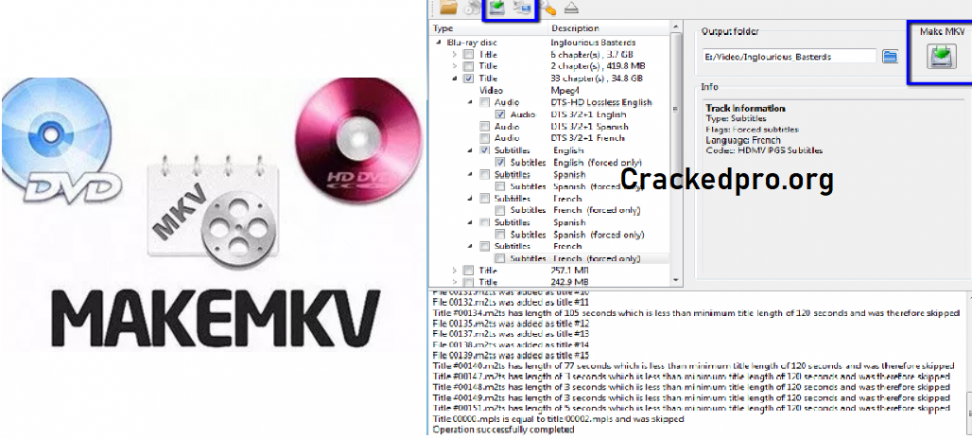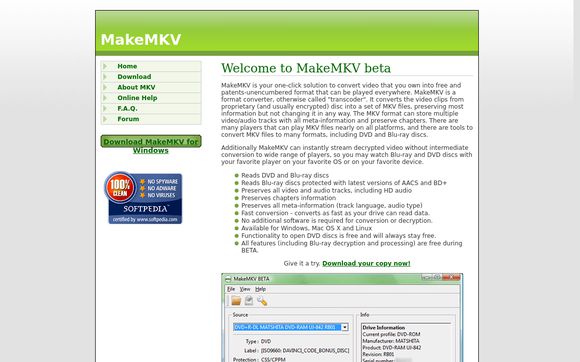

- #MAKEMKV REMUX MOVIE#
- #MAKEMKV REMUX FULL#
- #MAKEMKV REMUX SOFTWARE#
- #MAKEMKV REMUX TV#
- #MAKEMKV REMUX DOWNLOAD#

What do you use as a backup? I am currently using a 7TB external drive and have an additional at my parents. I did re-rip La La Land without the Spanish and French audio tracks and only lost a few GB which is fine. I have a 10TB RAID but am already using 6 TB so I know I can't do too many 70+GB movies. I just ripped Blade Runner: The Final Cut and was 45 GB. Not sure if that is your problem or not, but you can check the Plex Web status when playing back the DTS stream to see what all its transcoding.
#MAKEMKV REMUX FULL#
I have read some stuff in the Plex forums that playback of HDR is a bit messed up at the moment, which some clients triggering a full transcode of the video and audio if source requires any kind of conversion.

My PMS uses an i5-2500k, and it only struggles with transcoding 4k down to 1080p. Transcoding audio, even DTS, shouldn't tax your i7. Also, I read that Handbrake will always convert HDR to SDR unless you are using one of their experimental nightly builds. I am less concerned about the size since I have a 20TB RAID for my Plex Media Server.
#MAKEMKV REMUX MOVIE#
Every movie is different, but most will be 50-80GB.įor me, I use MakeMKV to pull the video track and the main audio track and then don't re-encode it unless the source is VC-1, MPEG2 or I want to burn in subtitles. Starmax wrote:Thats about the right size if you are pulling in all the audio. Do you all recommend re-ripping without the audio tracks or just expect each UHD to be about this size? I will be following the thread for recommendations on compressing UHD without noticeable quality loss using Handbrake. I am experiencing some lag when streaming from my Plex server (gigabit network), but only when using the DTS track (ACS has no lag but is commentary) because the Plex server has to transcode the audio on the fly.
#MAKEMKV REMUX DOWNLOAD#
I am just not seeing anyone's file size for an UHD that large, is it because of the audio tracks added? I did download an UHD REMUX of Dunkirk which was 46 GB and only two audio tracks. I have a 74 GB file size for La La Land, is this larger than normal? I did assume they would be larger since 4k is x4 the resolution of blu-ray but is H.265. Just bought an Asus BW-16D1HT and ripped La La Land with more UHDs coming in from Amazon soon. I have been following the forums and was excited when UHD support was added. I generally pull the movie off blu-rays with just about all the audio tracks to then select which tracks I want when I compress into Handbrake. This is done so that the corresponding video and audio are close together within the file making it easier to play and less strenuous on the drive - rather than say, putting all the video at the start of the file and all the audio at the end of the file (appending rather than interleaving) which would require the drive seeking back and forth over long distances to get successive video and audio frames.I am still a novice MakeMKV user. two frames of video, two frames of audio, two frames of video, two frames of audio, etc.). This might be done frame by frame (one frame of video, one frame of audio, another frame of video another frame of audio, etc.) or by some other grouping (e.g. I.e., the data within the file consists of a little video followed by a little audio, followed by a little more video and a little more audio, etc. It's called "multiplexing" because audio and video data are interleaved.

The cake is still the same cake, just the box is different. It's like taking a cake out of one box and putting it into another box. Re-multiplexing is the process of taking the compressed (or not) audio and video (and possibly other streams) out of one file and putting them into another (the container may be the same type or not) without decompressing and re-compressing them. Of course a (re-)muxing process natively, has nothing to do with re-encoding, de-interlacing, etc. So again, IMO it's about how you (want to) look at it. Or, if one tries to resolve an issue by muxing a sourcefile only with added/other muxing-settings, I would call that a remux too. Suppose you import a mkv into mkvtoolnix, drop a source-subtitle and add another one, mux to mkv again. In my view, the word remux would not only be used when "keeping original source streams and mux into another container". It's subject to consideration indeed, as ron spencer stated.
#MAKEMKV REMUX SOFTWARE#
Pre-playback, software de-interlacing for me forcibly comes into play when I need to slow-down certain sped-up (24fps based) PAL music material to native speed (4% speed-change for music is awfully much and can completely devastate groove & rhythm and tonal experience).Īs for the "remux phrase" itself, it's how you want to look at it. As stated earlier, it often is better to leave it as-is.
#MAKEMKV REMUX TV#
Normally I let my player or tv take care of de-interlacing.


 0 kommentar(er)
0 kommentar(er)
